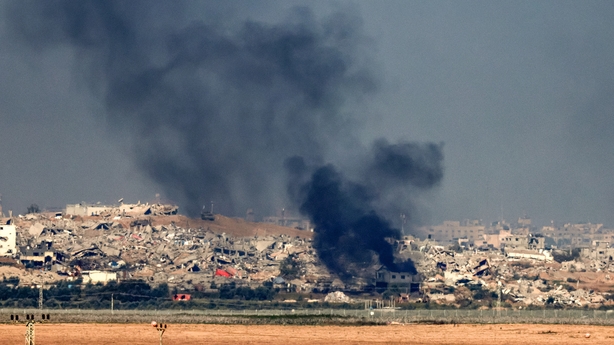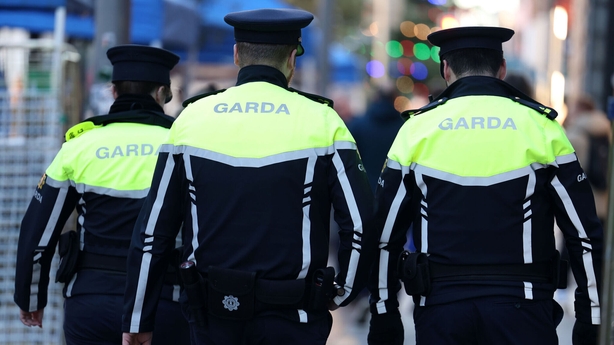The fallout of the Israeli-Hamas war - what is it?
Some, including the Prime Minister of Qatar, say an entire generation are at risk of becoming radicalised because of it.
Others say the United States and European countries are at greater terror risk.
In Ireland, the Government says "taking action to counter these threats is a priority" but the level of terror threat to Ireland has not been raised.
Worldwide there are security fears over potential terror attacks arising from radicalisation linked to the war in Gaza.
FBI Director Christopher Wray has warned Congress of a threat of terrorist attacks in the United States.
"The reality is that the terrorism threat has been elevated throughout 2023. The ongoing war in the Middle East has raised the threat of an attack against Americans in the United States to a whole other level", he said.

US fears are echoed in Europe.
Spain's Interior Minister Fernando Grande-Marlaska says Spain is on alert.
"The terrorist threat level in most EU counties is high. In Spain, we have five levels and we're at level four," he said after a recent European Council Justice and Home Affairs Ministerial meeting in Brussels, at the start of December.
"We are particularly concerned following the events in the Middle East and we're monitoring networks. We're looking into an increased risk of radicalisation," he said.
At the same press conference, Commissioner for European Home Affairs Ylva Johansson said there is a terror threat.
"The threat is higher now than before. We have also seen that anti-Semitic and anti-Muslim rhetoric is really also growing dramatically and so are disinformation. And taking all this together...that, yes, the threat is significant," said Commissioner Johansson.
We need your consent to load this rte-player contentWe use rte-player to manage extra content that can set cookies on your device and collect data about your activity. Please review their details and accept them to load the content.Manage Preferences
The threat level has not been raised in Ireland by the Government. The Department of Justice said radicalisation leading to violent extremism and terrorism is a concern.
Taking action to counter these threats is a priority for the Government, with gardaí continuing to put in place tactical and intelligence based measures to prevent and respond to the threat of attack.
"The threat arising from international terrorism remains a source of serious concern at EU level," a department spokesperson said in a statement to RTÉ's Morning Ireland.
The statement added that "recent terrorist attacks in France and Belgium in November, have further amplified concerns at EU level".
"In light of the current international threat environment, a number of member states recently raised their domestic terrorism threat level, while many member states increased protective security measures in place to respond to identified threats.
"Ireland is no different to any open democracy, and is therefore not immune from the threat posed by international terrorism," the spokesperson added.

"Taking action to counter these threats is a priority for the Government. The Garda Authorities continue to put in place a robust framework of measures, both tactical and intelligence-based, to prevent and respond to the threat of attack.
"In addition, additional protective security measures are deployed where necessary. They are supported in this work by the considerable skills and assets of the Defence Forces where they are needed. All the relevant agencies co-operate closely in respect of any threats identified that may have adverse implications for the security of the State.
"The level of threat from international terrorism in Ireland is kept under constant and active review by An Garda Síochána, in consultation with the Defence Forces, particularly in the light of ongoing developments and the international security landscape.
"The expert assessment of the threat from international terrorism is that while an attack in Ireland is possible, it is not considered likely. However, the authorities here remain vigilant to the possibility and there is no complacency in this regard. It is critical that the authorities here continue to take all necessary measures proportionate to the threat and have a robust legislative framework to enable them to respond effectively.
"The Irish authorities also work closely with their international counterparts in identifying and managing terrorist threats," the Department of Justice statement added.
Senator and Independent security analyst Tom Clonan says preparations need to be made for any potential attacks.
"The recent riots in Dublin have highlighted some of the resource and personnel issues that we have within An Garda Síochána. They are the primary intelligence agency within the State.
"I think in terms of preparation we need to continue to invest in An Garda Síochána.
"Also, we need to really stand shoulder-to-shoulder with all of our communities in Ireland.
"Because with the threat level being increased you will see an increase in in Islamophobia, you'll see an increase in tension between communities and it's very, very important that we try to counter toxic narratives, stand together in solidarity to counter the threat," Senator Clonan said.
The Israeli-Hamas war was prompted by the Hamas attack on Israel on 7 October, whose fighters killed 1,200 people and took 240 hostage.
Latest figures from the Gaza health ministry 19,453 people had been killed and 52,286 wounded in the Israeli assault on the Hamas-ruled enclave in more than two months of war.
Qatar's Prime Minister Sheikh Mohammed bin Abdulrahman Al Thani has warned that an entire generation in the Middle East is at risk of becoming radicalised because of the war in Gaza.
Senator Clonan agrees and says people in other Muslim countries will be frustrated and enraged by mounting death and destruction in Gaza.
"On the Arab street and in other Muslim countries you are going to see an increase in anger, frustration and rage.
"That will be exploited by radical Islamist groups like Hamas, like Islamic State, like al-Qaeda, like al- Shabaab - this is a predictable, an inevitable outcome to this kind of really, really disproportionate violence," said Senator Clonan.
Dr Michael Wolfowicz, a senior lecturer at the Institute of Criminology at the Hebrew University in Jerusalem, says figures show radicalisation in Gaza is a possibility. He also says deradicalisation could happen.
"Nobody seems to be asking whether Israel's war against Hamas has the potential to reduce radicalisation," he told Morning Ireland.
"I believe it has the potential to reduce it, perhaps to a similar degree of the potential it has to increase it.
"We have seen many images of Gazans coming out against Hamas, expressing regret for having supported Hamas.
"So, I do believe that there is a potential - I'm not saying this will happen - but there is certainly a good potential that by removing Hamas that could actually lead to a new situation where there's less support for terrorism - where they come to see that terrorism is not the way and it won't bring about their goals, their political goals or ideological goals and that it's actually detrimental to their cause.
"And, therefore there could be a reduction in support for terrorism or what we're calling here radicalisation," said Dr Wolfowicz.
Senator Clonan disagrees with Dr Wolowicz’s assessment.
"What they are doing in Gaza, they are sowing the seeds of their own destruction. It really is a recipe for disaster for radicalisation and for increased hostility and attacks on Israel.
"The history of human civilization, the history of conflict shows that violence never eliminates resistance. Violence begets violence, That's always been the way."







